Policies and Our Approach
To build a recycling-oriented society, the Suntory group will promote problem-solving efforts together with various stakeholders. Each employee of Suntory will work on taking responsible action to solve problems and take the initiative in bringing about a sustainable society.
Containers and packaging protect and preserve the quality of products until they reach customers. However, most end up becoming post-consumer waste.
The Suntory Group recognizes the social and environmental impacts that containers and packaging cause and established voluntary “Guidelines for the Environmental Design of Containers and Packaging” in 1997. Designs are made following the Guideline such as selecting material for labels and color of glass bottles that consider recycling. In addition, we are engaging in initiatives from the stand point of Life Cycle Assessment (LCA) to reduce environmental impact of containers and packaging.
3Rs of Containers and Packaging
The Suntory Group works to develop containers and packaging that give consideration to the environment, based on the 3Rs of “Reduce, Reuse, and Recycle.” We work on reducing the weight, using materials with less environmental impact, and designing packaging that is easy to recycle, while taking into consideration usability from the time customers drink the product to the time it is recycled. We also work in collaboration with various recycling organizations and local governments to promote recycling.
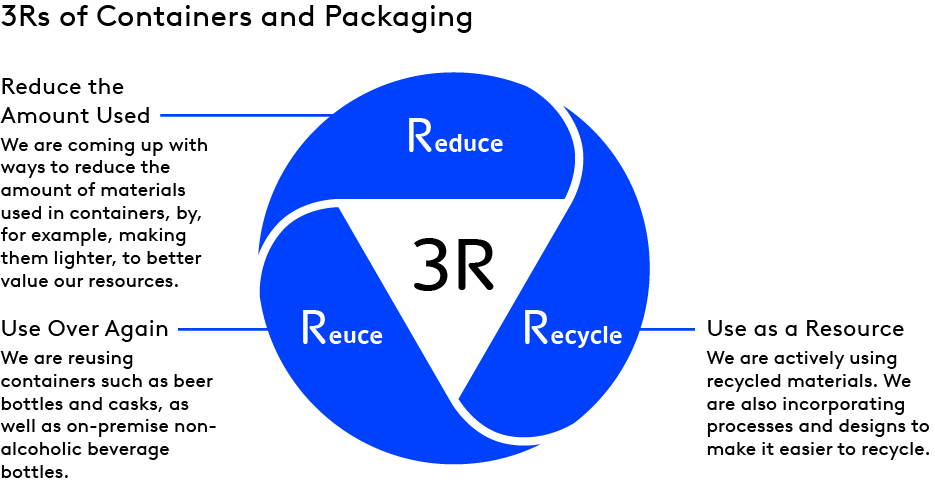
Promoting Structure
Global Sustainability Committee
To promote sustainability management, the Global Sustainability Committee (GSC) acts as an advisory committee to the Board of Directors. The Group’s sustainability strategies and the progress on priority themes (water, GHG, containers and packaging, raw ingredients, health, human rights and enriching life) are discussed in the GSC under the lead of the Chief Sustainability Officer.
For more information on the Global Sustainability Committee, see Environmental Management.
Targets and Progress
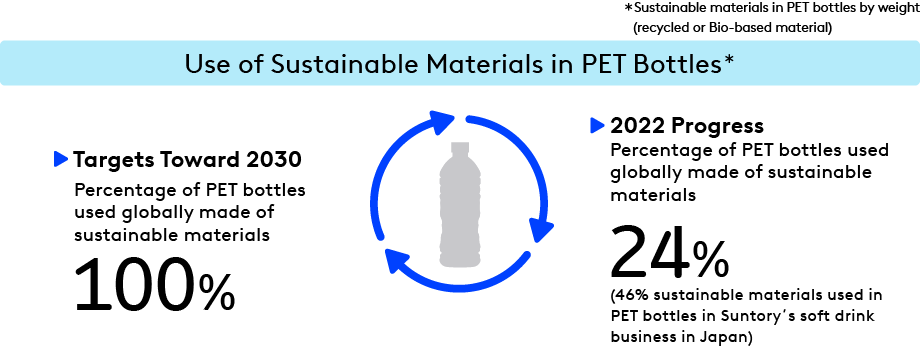
Our Initiatives
Initiatives for Plastic
Plastic products have enriched our lives through their usefulness. On the other hand, the environmental impact caused by improper handling of used plastics has become a social problem. In Japan, the Ministry of the Environment has formulated the “Plastic Resource Recycling Strategy” as a strategy to comprehensively promote resource recycling while recognizing the convenience of plastic products.
The Suntory Group also formulated the Plastic Policy in 2019 in order to strongly lead the transformation to a recycling-oriented and decarbonized society. Based on this policy, we aim to achieve 100% sustainable bottle by using only recycled or Bio-based material for all our PET bottles used globally by 2030 and eliminating the use of virgin petroleum-based materials.
Suntory Group Plastic Policy
Expressing gratitude toward the Blessings of Nature that are the source of Suntory’s products, the Suntory Group will provide strong leadership for transforming into a recycling-oriented and zero carbon society to bring about a world where diverse animal and plant life shines and resonates. With its diversity in usage and convenience, plastic has made our lives easier.
The plastic containers and packaging we use serve a useful function, but to prevent them from having a negative impact on the global environment, we will promote problem-solving efforts together with various stakeholders. Each employee of Suntory will work on taking responsible action to solve problems and take the initiative in bringing about a sustainable society.
-
1.Recycle & Renewable:
-
(1)Aim to switch all the PET bottles used globally for Suntory products to be made of recycled or Bio-based material by 2030, achieving zero use of virgin petroleum-based materials.
-
(2)Actively work and collaborate with government agencies, industry, environmental non-governmental and non-profit organizations for the measures necessary to develop an efficient recycling system based on the situation of each country where we do business.
-
2.Reduce & Replacement:
Reduce the amount of plastic used by changing the design of containers and packaging and look for the introduction of alternative containers that do not negatively impact the environment in order to effectively utilize resources. -
3.Innovation:
Actively invest in innovation for materials and processes that improve the recycling rate and minimize environmental impact. -
4.New Behavior:
Promote activities that drive change in consumer behavior. Each Suntory employee will work to change their lifestyle, promote sorting and collection, and actively participate in social contribution activities such as cleaning up rivers and beaches.
2R+B Strategy
In regards to PET bottle containers, we are taking action based on the 2R+B (Reduce/Recycle + Bio) strategy, which is unique to Suntory. The concept is to replace fossil-fuel-derived materials with renewable materials to the extent possible, while reducing the use of resin and using recycled materials in development to achieve thorough and effective use of resources.
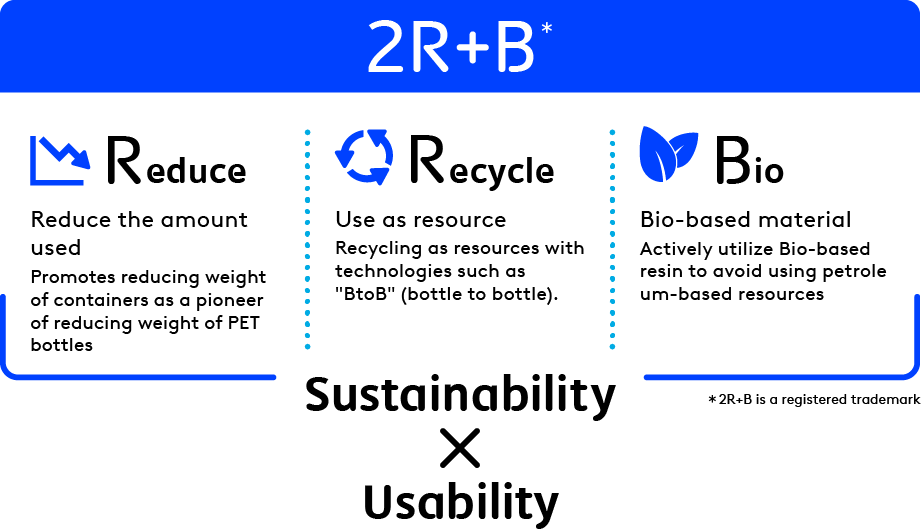
 Reduce: Lightweighting
Reduce: Lightweighting
For approximately 20 years now, the Suntory Group has been working to make PET bottles as well as their caps and labels lighter and thinner. We are aiming to effectively use resources while maintaining and improving bottle quality (maintaining beverage quality and ease of bottle use) while drinking.
Change in Weight of 550-mL Suntory Tennensui PET Bottles*1

-
*1500-mL capacity through 2009*
Change in Weight of 2-L Suntory Tennensui PET Bottles

 Recycle: Recycling PET Bottles
Recycle: Recycling PET Bottles
The Suntory Group engages in “bottle to bottle” horizontal recycling, where used PET bottles are turned into new ones.
Starting with introducing the Japanese soft drink industry’s first PET bottles using 100% recycled materials in 2012, we have continued to advance “bottle to bottle” horizontal recycling, including development of the world's first F-to-P direct recycling technology, which has lower CO2 emissions compared with conventional recycling methods.

For more information, see “Recycle: ‘Bottle to Bottle’ Horizontal Recycling”
 Bio: PET Bottles Using Bio-based Material
Bio: PET Bottles Using Bio-based Material
We have set the Suntory Group target of switching all products to using 100% sustainable PET bottles (made of recycled or Bio-based material) by 2030. Prioritizing environmentally friendly “bottle to bottle” horizontal recycling, we are aiming to achieve PET bottle circularity by repeatedly recycling PET bottles as a resource.
Meanwhile, there are needs in the soft drink industry as a whole to provide new resources to make up for some PET bottles being recycled for other purposes as well as the growth of the PET bottle beverage market. In response, in addition to “bottle to bottle” horizontal recycling, we are also working to develop PET bottles using Bio-based material.
In 2013, we launched a 550-mL PET bottle for Suntory Tennensui natural mineral water that uses 30% plant-derived material*. We started releasing a 2-L version in April 2023 and have plans for all Suntory Tennensui PET bottles to use plant-derived material by the fall of 2023.
-
*Excluding some products for vending machines
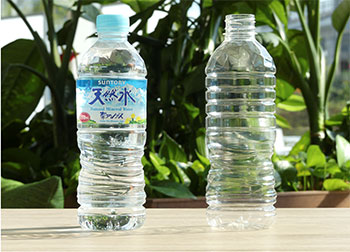
Current PET bottle (using 30% plant-derived material) (left)
PET bottle using 100% plant-derived material (right)
Suntory Holdings Ltd. and Anellotech, Inc., a green innovation and technology company in the United States, are working on collaborative development of a PET bottle that uses 100% plant-derived material. Construction began in 2016 on a development and testing plant to produce PET bottle materials in the state of Texas, and testing of the technology for commercialization was completed in 2019. We have achieved to produce paraxylene, a precursor of terephthalic acid that constitutes 70% of PET bottle materials, exclusively from inedible plant-derived material (woodchips) that does not affect the supply chain of materials for food use. We successfully created a PET bottle made from 100% plant-derived material using this technology in December 2021. This marks a breakthrough in commercializing PET bottles made from 100% plant-derived material that do not affect the supply chain of materials for food use.
Cooperation with Stakeholders
Establishment of R Plus Japan to Work on the Recycling of Used Plastics
12 companies (including Suntory) within the plastics supply chain established R Plus Japan Ltd., a joint venture company focused on the recycling of used plastics. As of April 2023, the number of participating companies has expanded to 40, and together with Anellotech, we are developing technologies to recycle used plastics.
Many types of plastic apart from PET bottles are reportedly incinerated* in Japan at present. This technology enables plastics including PET bottles to be chemically recycled by directly turning such plastics into base chemicals (benzene, toluene, xylene, ethylene, propylene and other chemicals). It requires fewer treatment processes compared to other chemical recycling that requires liquefaction and is anticipated to reduce CO2 emissions and energy use. Establishing this technology will allow more used plastic to be recycled efficiently.
RPlus Japan Corporation aims to contribute to the solution of the plastics problem, which is common worldwide, through collaboration across industries, in addition to technological development and its implementation in society.
-
*Includes thermal recovery (heat utilization), in which heat generated during incineration is recovered and utilized for power generation and heat supply
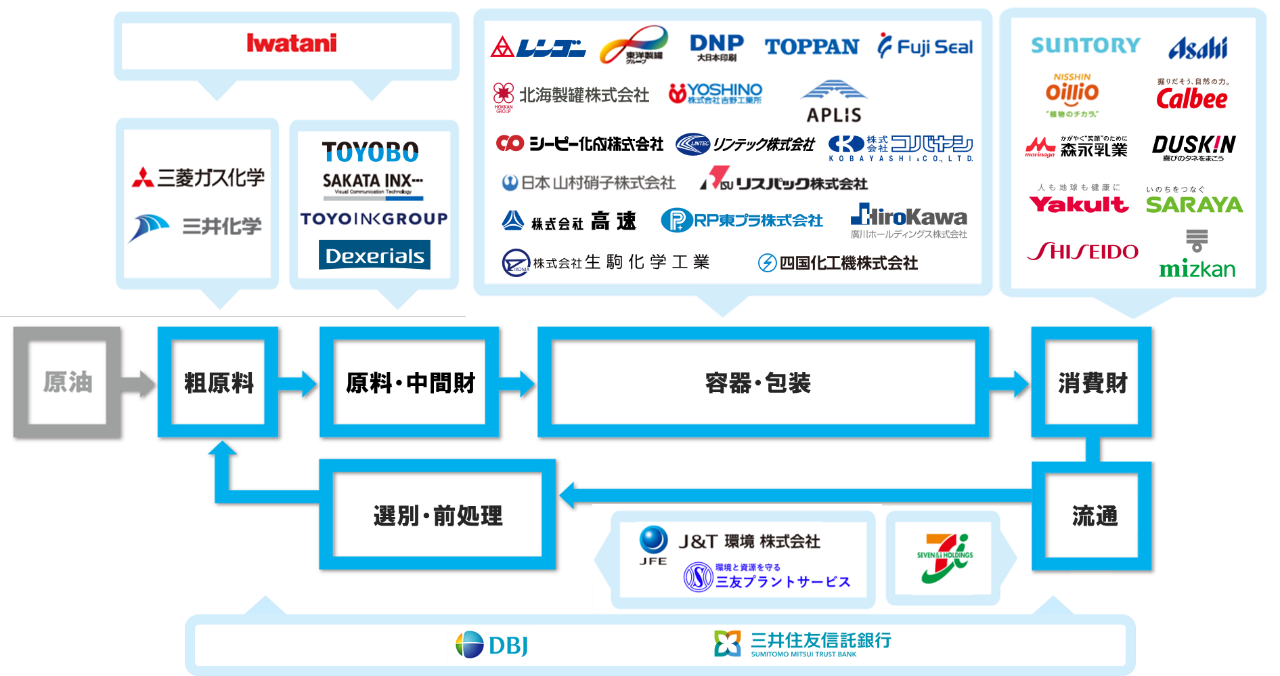
Social Activities
Suntory employees strive to change their lifestyle, promote sorting and collection, and actively participate in social contribution activities such as cleaning up rivers and beaches.
In September 2022, Suntory PepsiCo Vietnam Beverages in Vietnam conducted a beach cleanup near Hanoi in cooperation with Ocean Conservancy, a global marine nature conservation organization, with more than 150 participants, including employees and their families.
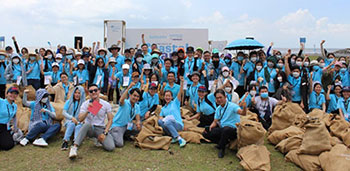
Alliance Membership
Joined the Clean Ocean Materials Alliance (CLOMA)
The Suntory Group has been a member of CLOMA, a public-private alliance established in January 2019 at the call of the Ministry of Economy, Trade and Industry, since its inception. Through this alliance, we will strongly cooperate with government agencies and industries to develop and promote alternative materials for plastics, and aim to build an efficient recycling system that meets the needs of each country through information dissemination and technical consulting services to overseas countries.
Joined the Global Plastic Action Partnership (GPAP)
In November 2019, the Suntory Group joined the Global Plastic Action Partnership (GPAP), a global alliance dedicated to solving environmental challenges caused by plastics. The GPAP is a global alliance for a circular economy of plastics, created by a public-private partnership based on the World Economic Forum with the aim of solving environmental challenges caused by plastics. Its members include the governments of the United Kingdom and Canada, as well as a wide range of businesses, investors, experts, NGOs, and other citizen organizations. In addition to exchanging information and sharing best practices at the global level, the Alliance has recently formed partnerships with the governments of Indonesia, Ghana, and Vietnam, and is engaged in community-based project activities at the local level.
WWF Japan’s Plastic Circular Challenge 2025
In February 2022, the Suntory Group joined the Plastic Circular Challenge 2025 organized by WWF Japan (World Wide Fund for Nature Japan) with the aim of realizing a sustainable society.
The Plastic Circular Challenge 2025 is a framework for companies to respond to WWF Japan’s call for action to solve the problems of plastics. Participating companies have set a milestone year of 2025 as their commitment to containers and packaging and single-use plastics, and will promote activities based on a “Sustainable Circular Economy” approach.
Cans/Bottles/Barrels/Paper Packaging/Cardboard
Reduce: Lightweighting
Lightweighting in Cans
We are furthering the lightweighting in cans such as those used for beer and coffee by aiming to dramatically reduce the amount of resources that are used while maintaining the usability for customers.
We have conducted initiatives for aluminum cans that include shrinking the diameter of the lid of beer cans in 2008 and the bodies of aluminum cans containing low-alcoholic beverages such as beer and Chu-Hi in 2014. In addition, the promotion of even more lightweighting is underway with the introduction of thinner bodies even in steel cans for coffee.
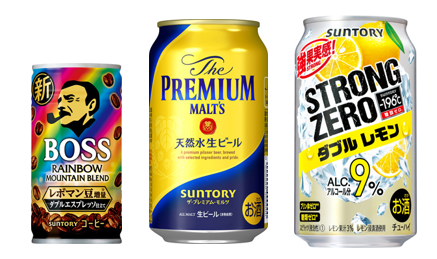
Boss Rainbow Mountain Blend
The Premium Malt’s
-196℃ Chu-Hi Strong Zero <Double Lemon>
Lightweighting in Glass Bottles
The medium-sized glass bottle for The Premium Malt’s has achieved weight savings of roughly 10 g to 460 g in 2014. The thickness of the body section that the label is adhered has been designed 0.2 to 0.3 millimeters thinner to prevent damage by bumping into other bottles. We are also improving the shape of the bottle so it does not get damaged when opening the bottle with cap opener and other improvements in the quality of the bottle.

The Premium Malt’s medium glass bottle
Reducing the Weight of Cardboard
To reduce our environmental impact, we are using short flap cardboard cartons in cooperation with the industry, beginning with using them for beverages in small PET bottles since the spring of 2012. Through this, we have reduced the use of paper by about 20% compared to conventional cardboard cartons. Short flap cardboard cartons have been used for beer and RTD products since 2019.
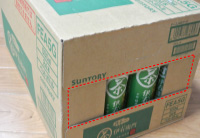
Short flap cardboard cartons that reduce cardboard usage on its sides
Reuse: Promoting Collection and Reuse of Containers
Reusing Glass Bottles and Barrels
Returnable containers (bottles, barrels) for beers and non-alcoholic beverages for restaurants are used often and we collect them via our own route and wash them for repeated use. Furthermore, we support the collection of glass bottles that are disposed of by liquor stores and restaurants through building collection routes in the distribution channel by specialized business operators since 1974.
One-way bottles are collected through effective sorting and collection routes by municipalities and other organizations.
Reuse: Promoting Collection and Reuse of Containers
The World’s First 100% Recycled Aluminum Can
Suntory Spirits Ltd. (Suntory) launched the world’s first 100% recycled aluminum can*1 in its limited editions of The Premium Malt’s CO2 Reduction Can (350 mL, 5.5% ABV) and The Premium Malt’s 〈Kaoru〉 Ale CO2 Reduction Can (350 mL, 6% ABV) in September 2022. This first of its kind 100% recycled aluminum can*1 was jointly developed by UACJ Corporation and Toyo Seikan Group Holdings, Ltd. and emits 60% less CO2 compared to when creating a regular aluminum can*2.
-
*1First as a commercialized SOT (Stay on Tabs) can which uses only recycled aluminum derived from canned materials (based on research by Toyo Seikan Group and UACJ, as of July 2022)
-
*2350 mL beverage aluminum can produced by Toyo Seikan using UACJ aluminum material
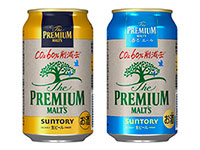
Shifting to Recycled Paper Containers
Paper containers were introduced for shochu and spirits in April 2010 and for wines in February 2014. Approximately 90% of the containers for alcoholic beverages have been changed to more recyclable paper containers*.
We have been using containers with evaporated aluminum on its inside for preserving quality but it was difficult to separate paper and aluminum when recycling. The new paper container implements vapor deposition of non-aluminum transparent material to improve ease of recycling.
-
*As of April 2023
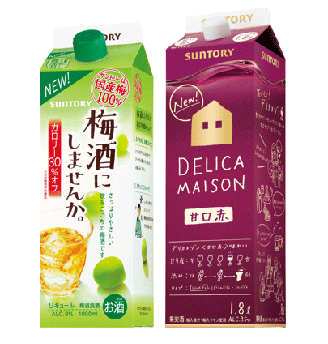
Suntory Umeshu
Delica Maison
Use of FSC®-Certified Cardboard
The Suntory Group is gradually adopting paper packaging materials that have obtained FSC certification*, which ensures proper management of international forests, for products made in Japan. We introduced FSC-certified cardboard packaging for Suntory Tennensui natural mineral water products manufactured after August 2017. Since 2018, we have switched to FSC-certified cardboard for the packaging of all Suntory Tennensui brand products. We are promoting the use of FSC-certified paper packaging materials throughout the Suntory Group, with the phased adoption of these materials for the cardboard cartons of non-alcoholic and alcoholic beverage products and for the packaging of six-can packs.
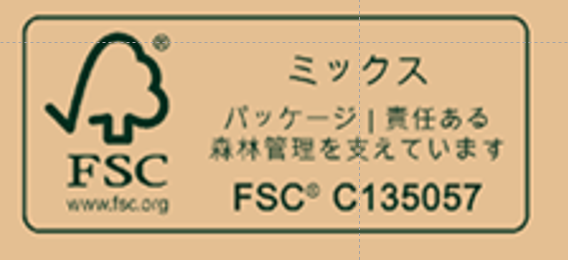
-
*Forest Stewardship Council (FSC) is an international organization that certifies timber produced from forests globally as well as the distribution and manufacturing processes of the cut timber. This certification considers the environmental conservation of these forests and recognizes timber produced in an economical and sustainable manner which generates revenue for the local community.
Overview of Waste Management
Promoting Waste Reduction and Recycling
As part of our efforts toward establishing a recycling-oriented society, we are working to reduce emissions of by-products and waste and to achieve 100% recycling.
Suntory Beverage & Food Europe has set the target of zero waste from its factories and is engaging in waste-reduction and recycling activities. With the target of reducing food waste from products by 50%, it is donating surplus products to charitable organizations to support people struggling with poverty as part of its efforts to achieve this target.
By-products and Waste Generation Performance
| Area | Amount of discharge (thousand tons) | ||
|---|---|---|---|
| 2020 | 2021 | 2022 | |
| Japan | 228 | 218 | 230 |
| Americas | 156 | 410 | 541 |
| Europe | 95 | 119 | 144 |
| Asia | 32 | 30 | 54 |
| Oceania | 7 | 7 | 6 |
| Africa | 0 | 0 | - |
| Total | 518 | 783 | 975★ |
-
*Data covers 27 production plants in Japan and 62 production plants overseas.
-
*The increase in emissions in the Americas is due to the addition of waste and by-products to be included from FY2021. The amount of the waste and by-products increased by 238 thousand tons due to the addition.
-
*Results have received independent assurance from KPMG AZSA Sustainability Co., Ltd. The assured numerical values are indicated with ★.
Recycling Rate of Japanese Plants and Flow for reuse of by-products and waste generated in each production process
| 2020 | 2021 | 2022 | |
|---|---|---|---|
| Amount of discharge (thousand ton) | 228 | 218 | 230 |
| Amount recycled (thousand ton) | 228 | 217 | 230 |
| recycling rate (%) | 100.0 | 99.7 | 100.0 |
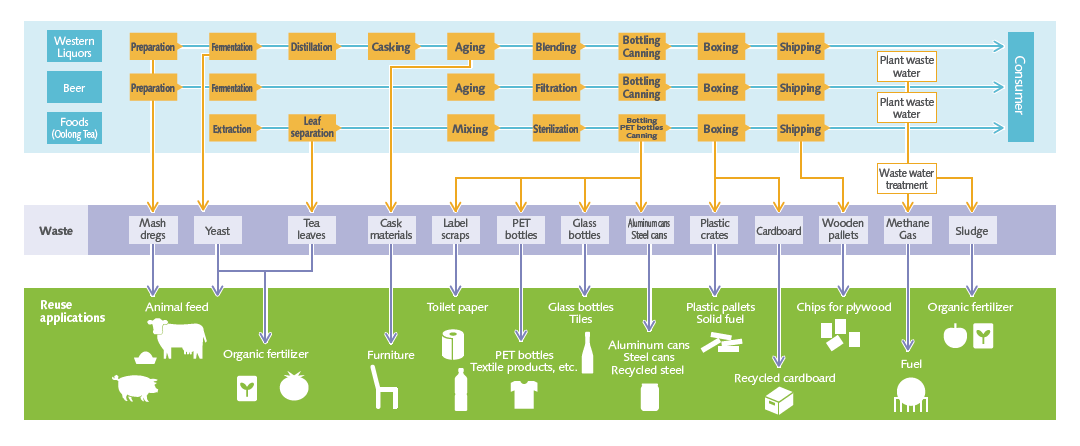
By-products and Waste Generation, Recycling Rate and the Purpose of Use for Recycled Products
| Type of waste | Main Purpose of Use | 2020 | 2021 | 2022 | |||
|---|---|---|---|---|---|---|---|
| Generation (t) | Recycling Rate (%) | Generation (t) | Recycling Rate (%) | Generation (t) | Recycling Rate (%) | ||
| Vegetable (glycation, tea, coffee dregs, etc.) | - Animal feed - Fertilizer |
164,185 | 100 | 158,823 | 100 | 167,855 | 100 |
| Sludge (excess sludge, etc.) | - Fertilizer | 30,275 | 100 | 27,337 | 100 | 28,396 | 100 |
| Wood waste (cask, palletes) | - Animal feed - Fertilizer |
5,186 | 100 | 5,267 | 100 | 3,658 | 100 |
| Glass and ceramic scrap | - Glass materials - Base course material |
2,285 | 100 | 1,337 | 100 | 1,172 | 100 |
| Paper scraps (cardboards, paper labels, etc.) | - Recycled paper - Cardboard materials |
5,520 | 100 | 5,398 | 100 | 5,735 | 100 |
| Plastic | - Palette - Solid fuel - Supplementary fuel |
6,033 | 100 | 5,796 | 100 | 5,810 | 100 |
| Metal scraps (aluminum, steel) | - Aluminum - Steel ingredients |
3,314 | 100 | 3,506 | 100 | 3,123 | 100 |
| Other | 11,558 | 100 | 9,731 | 100 | 13,979 | 100 | |
| Total | 228,355 | 100 | 217,925 | 100 | 229,728 | 100.0 | |
-
*Data covers 27 production plants in Japan
Applications of Recycled Materials
We are furthering resource recycling for the by-products and waste produced by the Suntory Group in various applications.
-
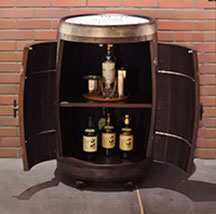
Barrel cabinet
-
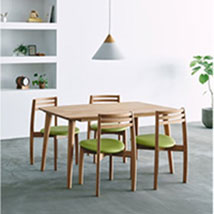
Dining Set “TARURU”
-
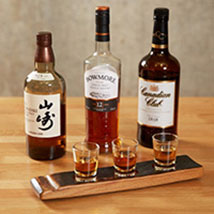
Drink sampling tray made from barrel
For more information, see “Suntory Barrel Story”
Building a Recycling Circulation Cycle for Food Waste – Izutsu Maisen Co., Ltd.
Izutsu Maisen Co., Ltd. is actively working to reduce and reuse food waste so as not to waste the precious gifts of nature. One predominate initiative is the setup of a recycling circulation cycle for the crusts of bread.
Izutsu Maisen cuts off the crusts of the bread when they make their popular fried Pork fillet cutlet sandwiches. These bread crusts are generally given to business operators who are able to recycle them as feed, but Izutsu Maisen launched their original Amai-Yuwaku pork brand that raises pigs on this feed in 2012 because the crusts are suitable as feed. This is an initiative that uses the bread crusts once again in a cycle as a raw material such as in the pork cutlets once.
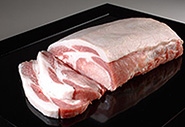
Original Amai-Yuwaku pork brand